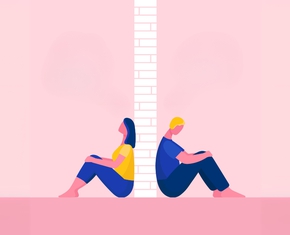The views expressed in our content reflect individual perspectives and do not represent the authoritative views of the Baha'i Faith.
When my grandfather was a child, his father was kidnapped and taken hostage to the mountains.
On another occasion, my grandfather and his family had to barricade their door with couches and chairs to keep out the angry mob screaming and swinging chains outside.
When he was a child, neighborhood boys would throw rocks at him while he walked down the street. When he went to the public bath, he was required to drain the pool he had bathed in because water touched by him was deemed filthy and unclean.
This persecution was inflicted upon him and his family because of one thing: they are Baha’is. Anyone who is a follower of the Baha’i Faith was (and still is) heavily persecuted by the government and clergy of Iran. As a result of this prejudice and resentment, many Baha’is are killed, tortured, barred from education, and subject to ridicule. Just recently, the government of Iran announced that Baha’is cannot have identification cards unless they renounce their Faith. This new rule makes it impossible for Baha’is to receive healthcare, obtain credit cards, and get passports.
To escape this persecution, my then 19-year-old grandfather sailed to New York City in search of a better life in the 1960s. When he first arrived in the United States, he was alone and knew little English. To get by he worked in many different low-paying jobs such as a bellboy, a busboy, a dishwasher, a waiter, and on a factory line where he stuck brushes onto handles again and again. Because he had a student visa he had to go to school full-time while working full-time to pay his rent and his entire school tuition. Once, he was locked out of his small apartment because he was unable to pay the weekly $7 rent, and so, that night he slept on a bench on a grassy area separating traffic on Broadway in Manhattan. My grandfather has now written down these stories and memories in his new book, “Foreigner: From an Iranian Village to New York City.”
My grandfather Hussein Ahdieh, who we call “Baba Aziz” (Persian for “dear father”), has always told my sister and me stories of his life in Iran and his journey to America. Some stories were funny (he likes to joke a lot), some were sad, and some were hopeful. However, after reading Foreigner, I realized that these stories we had grown up hearing revealed only a small part of a bigger picture. I began to put together how hard he worked and how many obstacles he faced. He came to a foreign country with no language or money, and got a Ph.D. in education, became a founder and director of a school in Harlem for high school dropouts, (or force outs, as he likes to call individuals pushed out of the system because of injustice), then became a successful businessman and an author. He faced obstacle after obstacle, but never gave up. Like Abdu’l-Baha, the son of Baha’u’llah, the prophet and founder of the Baha’i Faith wrote, he persevered through great tests and trials for the betterment of the world:
… may all your intentions center in the welfare of humanity, and may you seek to sacrifice yourselves in the pathway of devotion to mankind. Even as Jesus Christ forfeited His life, may you, likewise, offer yourselves in the threshold of sacrifice for the betterment of the world; and just as Baha’u’llah suffered severe ordeals and calamities nearly fifty years for you, may you be willing to undergo difficulties and withstand catastrophes for humanity in general. May you bear these trials and tests most willingly and joyously, for every night is followed by a day, and every day has a night. Every spring has an autumn, and every autumn has its spring. – Abdu’l-Baha, The Promulgation of Universal Peace
I began to think about where he found all of his strength and grit, which took him to the place where he is today, and I wondered: how I could find that determination?
I realized that reading Foreigner made me more grateful for what I have. I live in a country that allows me to practice my religion, have free speech, apply to any school, and get an education. I can find anything I want to learn by just going to the library and opening a book. I have two supportive parents, an older sister, and friends who help me deal with any of my problems.
But I know that few people in the world have all of these advantages in life. My family lived in Ethiopia when I was about three years old, and kids with no shoes sometimes ran after our car asking for money, while I sat in my tall car seat in a car with leather seats and air conditioning. After reading “Foreigner,” I began to wonder why some people are born into luxury while others are born with so little.
I realized that if I do not make the most of my opportunities, I will waste the world’s resources. I have two options — I can just say that I am thankful for what I have, and then misuse my opportunities, or I can truly show my thankfulness through action by helping others without such opportunities. I can actively exhibit my thankfulness by helping to teach capacity-building classes to children where I live, by being a good friend to others in difficult situations, by serving at homeless shelters, and by organizing food drives with our Baha’i junior youth group.
Reading my grandfather’s story inspired me to overcome any obstacle and to persevere through any problem – but it also made me reflect on how I want to live my life. I could live a life of ruining my opportunities and taking what I have for granted, or I can be thankful for what and who I have while showing my thankfulness by helping others and giving back to the world.
















Comments
Sign in or create an account
Continue with Googleor